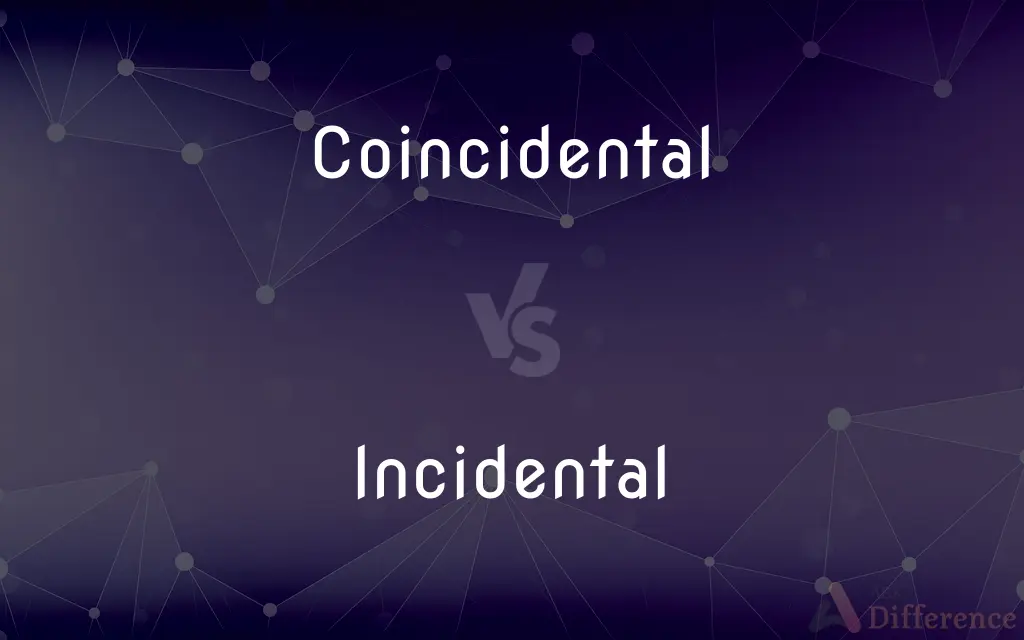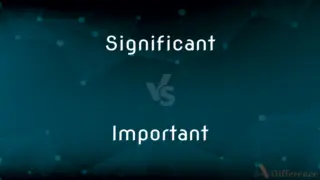Coincidental vs. Incidental — What's the Difference?
Edited by Tayyaba Rehman — By Fiza Rafique — Updated on March 9, 2024
Coincidental events occur by chance without planning, whereas incidental events are secondary, arising as a minor consequence of something more significant.

Difference Between Coincidental and Incidental
Table of Contents
ADVERTISEMENT
Key Differences
Coincidental events are those that happen by chance, without any intentional planning or causal connection. Incidental, on the other hand, refers to occurrences that are not central to the main event but happen as a side effect or minor consequence.
While coincidental events are marked by their lack of intentionality and causal relationship, incidental events are characterized by their minor or secondary nature. A coincidental meeting is unexpected and occurs by chance, whereas an incidental discovery is a byproduct of another activity.
The perception of coincidental events often leads to a sense of wonder or disbelief due to their random nature, while incidental events might not elicit as strong a reaction, given their role as side effects or minor aspects of a larger situation.
Both terms highlight different aspects of unplanned events. Coincidental emphasizes the randomness and lack of connection between the events, creating a sense of surprise. Incidental points to the secondary, often overlooked consequences that accompany primary actions or events.
Comparison Chart
Definition
Happening by chance without planning
Occurring as a minor consequence
ADVERTISEMENT
Nature
Unplanned and unexpected
Secondary and arising as a side effect
Intentionality
None; purely by luck or chance
Not intended, but related to a main event
Impact on main event
None; unrelated to main event
Minor; supplements or results from a main event
Perception/Reaction
Surprise or disbelief
Generally minimal surprise
Compare with Definitions
Coincidental
Happening by chance.
The coincidental meeting of two classmates in Paris was a pleasant surprise.
Incidental
Secondary occurrence.
The incidental benefits of the new policy were widely appreciated.
Coincidental
Random occurrence.
The coincidental alignment of two events caused much speculation.
Incidental
Arising as a side effect.
Incidental discoveries during the research were unexpectedly useful.
Coincidental
Serendipitous.
The coincidental encounter with a celebrity made their day unforgettable.
Incidental
Minor consequence.
The incidental damage to the surrounding area was quickly repaired.
Coincidental
Unplanned.
Their coincidental discovery of mutual interests led to a lasting friendship.
Incidental
Related to something else.
The incidental costs were included in the final bill.
Coincidental
Lacking intention.
Their arrival at the same time was purely coincidental.
Incidental
Not the main focus.
The incidental details of the story added depth to the characters.
Coincidental
Occurring as or resulting from coincidence.
Incidental
Occurring or likely to occur as an unpredictable or minor consequence
"the principle that even annoying, intrusive, and offensive speech is to be protected by the courts and tolerated by the public as incidental to an open society" (Frederick Schauer).
Coincidental
Happening or existing at the same time.
Incidental
Of a minor, casual, or subordinate nature
Incidental expenses.
Coincidental
Occurring as or resulting from coincidence.
Incidental
A minor accompanying item or expense
A pocket in the suitcase for incidentals.
Coincidental
Happening or existing at the same time.
Incidental
Loosely associated; of limited relevance except indirectly; only accident related.
That character, though colorful, is incidental to the overall plot.
Incidental evidence
Coincidental
Coincident.
Incidental
Existing tangentially, being a byproduct, a tangent, or a likely consequence.
Injuries are incidental to contact sports: they're going to happen.
Coincidental
Occurring or operating at the same time;
A series of coincident events
Incidental
Occurring by chance.
Incidental
Entering or approaching, prior to reflection (more frequently incident).
Incidental
Minor items, not further defined. Incidental expense.
She's costing us a lot in incidentals.
Incidental
Something that is incidental.
Incidental
Happening, as an occasional event, without regularity; coming without design; casual; accidental; hence, not of prime concern; subordinate; collateral; as, an incidental conversation; an incidental occurrence; incidental expenses.
By some, religious duties . . . appear to be regarded . . . as an incidental business.
I treat either or incidentally of colors.
Incidental
An incident; that which is incidental; esp., in the plural, an aggregate of subordinate or incidental items not particularized; as, the expense of tuition and incidentals.
Incidental
(frequently plural) an expense not budgeted or not specified;
He requested reimbursement of $7 for incidental expenses
Incidental
An item that is incidental
Incidental
(sometimes followed by `to') minor or casual or subordinate in significance or nature or occurring as a chance concomitant or consequence;
Incidental expenses
The road will bring other incidental advantages
Extra duties incidental to the job
Labor problems incidental to a rapid expansion
Confusion incidental to a quick change
Incidental
Following as a consequence;
An excessive growth of bureaucracy, with related problems
Snags incidental to the changeover in management
Incidental
Not of prime or central importance;
Nonessential to the integral meanings of poetry
Common Curiosities
How do coincidental events impact us?
Coincidental events often surprise or amaze us due to their unexpected nature.
What does incidental mean?
Incidental refers to something that happens as a minor part or consequence of something else.
What is an example of a coincidental event?
Meeting an old friend in an unexpected place is an example of a coincidental event.
Can something be both coincidental and incidental?
It's uncommon, as coincidental focuses on chance while incidental implies a connection to a larger event, though minor.
What does coincidental mean?
Coincidental refers to events that happen by chance, without any planning or deliberate intention.
Do coincidental events have a cause?
They occur by chance and do not have a deliberate cause.
Why are some events considered incidental?
Because they occur as a secondary outcome or minor part of a primary event.
Can planning prevent incidental outcomes?
Not always, as incidental outcomes can arise from unforeseen aspects of the main event.
Can incidental events be beneficial?
Yes, incidental outcomes can sometimes be unexpectedly beneficial.
What's an example of something incidental?
Discovering an old photo while searching for something else is incidental.
How can we differentiate between coincidental and incidental?
By determining if the event occurred by pure chance or as a secondary consequence of another action.
Is incidental always negative?
No, incidental can be neutral or positive, depending on the context and outcome.
How should one interpret incidental findings?
With caution, considering them in the context of their primary activity or focus.
Do people often confuse coincidental with incidental?
Yes, because both involve unplanned occurrences, but they differ in their relation to a main event and intentionality.
Are coincidental events rare?
They can be, given their nature of happening by sheer chance.
Share Your Discovery

Previous Comparison
Dialect vs. Dialogue
Next Comparison
Significant vs. ImportantAuthor Spotlight
Written by
Fiza RafiqueFiza Rafique is a skilled content writer at AskDifference.com, where she meticulously refines and enhances written pieces. Drawing from her vast editorial expertise, Fiza ensures clarity, accuracy, and precision in every article. Passionate about language, she continually seeks to elevate the quality of content for readers worldwide.
Edited by
Tayyaba RehmanTayyaba Rehman is a distinguished writer, currently serving as a primary contributor to askdifference.com. As a researcher in semantics and etymology, Tayyaba's passion for the complexity of languages and their distinctions has found a perfect home on the platform. Tayyaba delves into the intricacies of language, distinguishing between commonly confused words and phrases, thereby providing clarity for readers worldwide.
















































